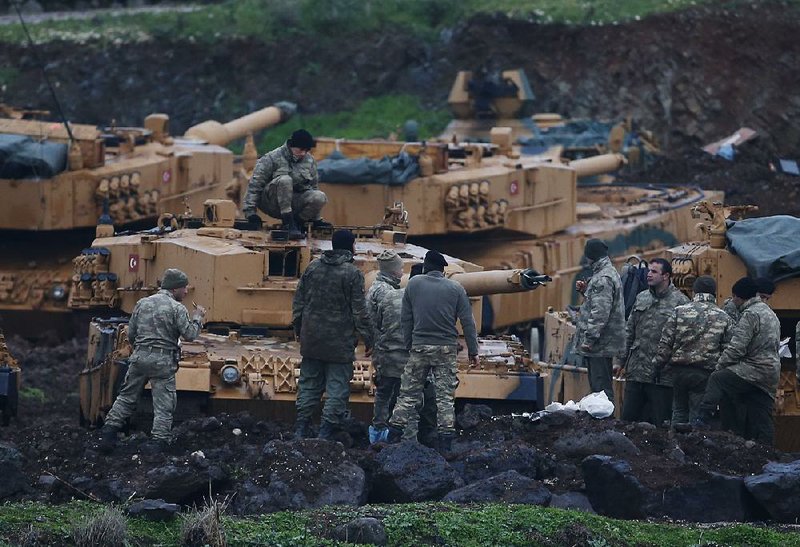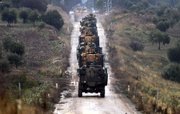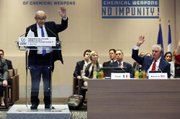Secretary of State Rex Tillerson said Tuesday that Russia is responsible for recent gas attacks against civilians in Syria and called on Moscow to refrain from voting on Security Council measures about chemical weapons in the country.
Speaking in Paris, Tillerson blamed Russia for the apparent use of chlorine gas Monday in a rebel stronghold in suburban Damascus. Women and children were among 20 victims who reportedly suffered gas inhalation and were treated for breathing problems. Syria has denied using poisonous gas in its push against the rebels. Russia says extremists have used chemical weapons in the past.
Doctors inside Syria have reported four such attacks since the start of the year, including two on Monday. Medical personnel said dozens of civilians have been treated for symptoms of exposure to chlorine, including many women and children.
"Whoever conducted the attacks, Russia ultimately bears responsibility," Tillerson said of Monday's attack in East Ghouta and other suspected gas attacks since Russia began backing government forces in Syria.
Rescue workers said pro-government forces fired nine shells at dawn carrying suspected chlorine gas on a densely populated residential area in the Damascus suburb. Medics in the enclave said they had treated four women, seven children and 10 men with breathing difficulties and other symptoms consistent with exposure to the chemical weapon.
Hours later, pro-government media said rebel forces responded by shelling the Old City of Damascus, killing nine civilians, including a 3-year old child.
Separately, doctors from the Syrian American Medical Society, a nonprofit supporting hospitals across opposition-held parts of Syria, reported another attack on the northern province of Idlib. "Four people were treated in our hospital in Idlib with symptoms indicating exposure to chlorine," said Mohamed Katoub, a Turkey-based spokesman for the organization.
Violence has intensified in Idlib as the Syrian government presses an offensive against al-Qaida-linked rebels there.
Tillerson said Russia's failure to rid Syria of chemical weapons violates a 2013 disarmament agreement it made with the United States. After a chemical attack in Ghouta in August 2013 killed hundreds of people, Russia and the United States brokered an agreement that called for Syria's arsenal of chemical weapons to be removed or destroyed by the middle of 2014.
"There is simply no denying that Russia, by shielding its Syrian ally, has breached its commitments to the United States," he said.
Tillerson was speaking at a meeting of 29 countries trying to identify, shame and sanction those who use chemical weapons. Tillerson said their initiative puts perpetrators "on notice."
"You will face a day of reckoning for your crimes against humanity, and your victims will see justice done," he said.
French Foreign Minister Jean-Yves Le Drian said, "Those who carry out chemical weapons attacks need to be made aware that we know who they are, and we will go after them."
The French government announced Tuesday that it is freezing the assets of companies that help furnish material to the Syrian Scientific Studies and Research Center, a Syrian lab accused of producing chemical weapons. France says affiliated companies based in multiple countries have been furnishing materials for the manufacture of chemical weapons, including sarin gas.
The United States has urged Russia to force Syrian President Bashar Assad to join peace negotiations sponsored by the United Nations that are to resume later this week in Vienna. Moscow has worked with Iran and Turkey to conduct parallel peace talks in Astana, Kazakhstan, and the Russian city of Sochi as the civil war stretches into its seventh year.
Tillerson dismissed Moscow's authority to be further involved in attempts to broker peace in Syria, saying, "Russia's failure to resolve the chemical weapons issue in Syria calls into question its relevance to the resolution of the overall crisis."
He said Russia must stop vetoing, or at least abstain, from future Security Council votes on the use of chemical weapons in Syria.
HALEY CRITICISM
Shortly before Tillerson spoke, Nikki Haley, the U.S. ambassador to the U.N., also criticized Russia in relation to the attacks.
She singled out Russia's November veto of a resolution to renew the Joint Investigative Mechanism, a technical group investigating the use of chemical weapons in Syria.
Russia said the panel had been biased and unprofessional, accusations that the United States and its allies angrily disputed.
"When Russia killed the JIM, they sent a dangerous message to the world -- one that not only said chemical weapons use is acceptable but also that those who use chemical weapons don't need to be identified or held accountable," she said in a statement. "If these reports are true, this attack in Syria should weigh heavily on their conscience."
Before it was disbanded, the Joint Investigative Mechanism found that both the Syrian government and Islamic militants had used chemical weapons against civilians. Such weapons are banned by an international treaty that Assad's government signed in 2013.
Russia, which has staunchly defended Assad, both on the battlefield and at the U.N., has never conceded that his forces have used chemical weapons in the conflict.
In particular, Moscow objected to the investigative panel's conclusions that Assad's forces carried out a sarin nerve agent attack on the rebel-held village of Khan Sheikhoun last April that killed at least 83 people and sickened close to 300.
The attack prompted President Donald Trump to order a cruise missile attack on an airfield that U.S. intelligence officials said had been used by Assad's air force to strike Khan Sheikhoun.
Russian Deputy Foreign Minister Sergei Ryabkov called the allegations Tuesday that Russia was obstructing the investigation into chemical attacks "dirty and mendacious," according to Russian news agency Interfax.
Russia proposed Tuesday that the Security Council create a new inquiry to establish blame for chemical attacks in Syria, a move condemned by the United States as an attempt to distract from previous U.N. findings that Assad's military had carried out the April sarin attack.
"When Russia doesn't like the facts, they try and distract the conversation. That's because the facts come back over and over again to the truth Russia wants to hide -- that the Assad regime continues to use chemical weapons against its own people," Haley said.
TURKISH ASSAULT
The United States also has expressed growing concern about a Turkish assault against Kurdish militias in Syria. Both the U.S. and France on Tuesday urged Turkey to exercise restraint in its offensive against a Kurdish-held enclave in northern Syria, where the U.N. says an estimated 5,000 people have been displaced by the fighting.
Turkish troops and allied Syrian fighters pressed ahead with their operations in Afrin for the fourth day, approaching from three sides and meeting stiff resistance from the U.S.-allied Kurdish militia that controls the enclave.
The U.N. said most of the displaced people are still inside Afrin because Kurdish forces are preventing civilians from leaving and Syrian government forces are keeping them out of adjacent areas. International aid groups have no presence in Afrin, which is surrounded by Turkey and rival Syrian forces.
On Tuesday, the Kurdish militia, known as the People's Defense Units, regained control of a village breached by Turkish forces. The Turkish forces also were repelled from a hill they seized a day earlier on the eastern edge of the district.
The People's Defense Units is a key U.S. ally against the Islamic State and played a major role in driving the extremists from much of northern and eastern Syria. The U.S. military operates bases in Kurdish-controlled territory in northern Syria but not in or near Afrin.
Ankara views the People's Defense Units as a threat because of its links to the decades-old Kurdish insurgency in Turkey. Turkey says it aims to create a 20-mile deep "secure zone" in Afrin, which is in northwestern Syria near the border.
Le Drian said the intense fighting in recent days is a sign that new conflicts could break out in the region as the Islamic State group is defeated.
He warned that without a political solution to the multisided Syrian civil war, the region could again explode, with conflicts "just as dramatic" as the war on the Islamic State.
U.S. Defense Secretary James Mattis, who is currently traveling in Asia, said the fighting "disrupts what was a relatively stable area of Syria" and "distracts from the international efforts to ensure the defeat of ISIS," using an acronym for the Islamic State.
At least 27 civilians, including eight children and four women, have been killed in the fighting in Afrin, mainly in Turkish airstrikes, according to the Syrian Observatory for Human Rights, a Britain-based group that monitors the civil war.
At least three Turkish soldiers have been killed since the offensive began Saturday, and at least one civilian was killed in Turkey by cross-border shelling.
The Observatory said 38 Kurdish fighters and 43 Turkish-backed Syrian militiamen have been killed.
Information for this article was contributed by Carol Morello and Louisa Loveluck of The Washington Post; by Michael Schwirtz of The New York Times; and by Matthew Lee, Angela Charlton, Sarah el Deeb, Philip Issa and Zeynep Bilginsoy of The Associated Press.
A Section on 01/24/2018



